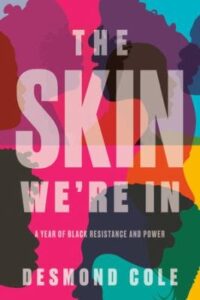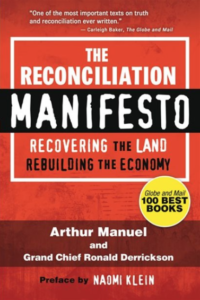Anti-oppression Resources
All resources below are meant to provide useful information for adult educators working on issues of social equity and social justice. They are recommended by CASAE members, and they do not necessarily represent the endorsement of CASAE as an association. The resources provided are posted in the language received. If you see any issues with the resources posted or have additional resources to recommend, please email casae.aceea@csse.ca. All resources posted are at the discretion of the CASAE Board of Directors.
A note from the administrators of this site
These resources were sent to CASAE by our members within the current context of the Black Lives Matter Movement, the Indigenous Rights Movement, and the need to actively participate in anti-racist learning and initiatives. Although this list is focused specifically on anti-racist resources, there is a need to include resources that address patriarchy and homophobia. This list will be updated bi-monthly, and additional resources will be added to this list as we go. Help us work towards decolonization by sending us resources that will help this resource guide address all areas of oppression, with a focus on the Canadian context.
In Solidarity,
Yeonjoo & Cortney
A COLLECTION OF RESOURCES FROM CASAE MEMBERS
Online Articles/Websites with Resources
Remembering 27 Black, Indigenous, and racialized people killed by Canadian police | Cole’s Notes
Teaching Tolerance – Website
Video
-
Netflix
-
Dear White People (Justin Simien)
-
13th (Ava DuVernay)
-
When they See Us (Ava DuVernay)
-
See You Yesterday (Stefon Bristol)
-
American Son (Kenny Leon)
-
-
White Privilege by John Amarchi
-
Before You Call the Cops
-
Unmasking Racism – CBC featuring Annete Henry and Handel Wright
-
How to Become an Ally – CBC by Nadia Jannif
-
Black politics and racial inequality – Keynote speech by Keeanga-Yamahtta Taylor
-
Why is Everything White – BBC with Mohammed Ali
The administration of this page is done on the unceded traditional territories of the Lewkungen peoples as well as the Songhees, Esquimalt, and WSÁNEĆ peoples.
Books
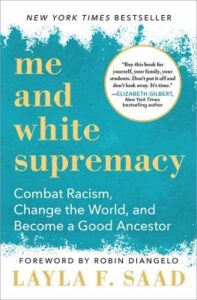 Me and White Supremacy by Layla F. Saad; Robin DiAngelo (Foreword by)
Me and White Supremacy by Layla F. Saad; Robin DiAngelo (Foreword by)
This eye-opening book challenges you to do the essential work of unpacking your biases, and helps white people take action and dismantle the privilege within themselves so that you can stop (often unconsciously) inflicting damage on people of color, and in turn, help other whitepeople do better, too. “Layla Saad is one of the most important and valuable teachers we have right now on the subject of white supremacy and racial injustice.”
 White Fragility: Why it’s so hard for white people to talk about racism by Robin DiAngelo; Michael Eric Dyson
White Fragility: Why it’s so hard for white people to talk about racism by Robin DiAngelo; Michael Eric Dyson
In this “vital, necessary, and beautiful book” (Michael Eric Dyson), antiracist educator Robin DiAngelo deftly illuminates the phenomenon of white fragility and “allows us to understand racism as a practice not restricted to ‘bad people’ (Claudia Rankine). Referring to the defensive moves that white people make when challenged racially, white fragility is characterized by emotions such as anger, fear, and guilt, and by behaviors including argumentation and silence. These behaviors, in turn, function to reinstate white racial equilibrium and prevent any meaningful cross-racial dialogue. In this in-depth exploration, DiAngelo examines how white fragility develops, how it protects racial inequality, and what we can do to engage more constructively.
The Skin We’re In by Desmond Cole
A bracing, provocative, and perspective-shifting book from one of Canada”s most celebrated and uncompromising writers, Desmond Cole. The Skin We”re In will spark a national conversation, influence policy, and inspire activists. In his 2015 cover story for Toronto Life magazine, Desmond Cole exposed the racist actions of the Toronto police force, detailing the dozens of times he had been stopped and interrogated under the controversial practice of carding. The story quickly came to national prominence, shaking the country to its core and catapulting its author into the public sphere. Cole used his newfound profile to draw insistent, unyielding attention to the injustices faced by Black Canadians on a daily basis.
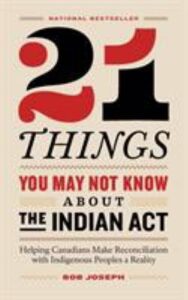 21 things you may not know about The Indian Act by Joseph, Bob
21 things you may not know about The Indian Act by Joseph, Bob
Based on a viral article, 21 Things You May Not Know About the Indian Act is the essential guide to understanding the legal document and its repercussion on generations of Indigenous Peoples, written by a leading cultural sensitivity trainer. Since its creation in 1876, the Indian Act has shaped, controlled, and constrained the lives and opportunities of Indigenous Peoples, and is at the root of many enduring stereotypes.
 Settler: Identity and Colonialism in 21st Century Canada by Emma Battell Lowman and Adam J. Barker
Settler: Identity and Colonialism in 21st Century Canada by Emma Battell Lowman and Adam J. Barker
Through an engaging, and sometimes enraging, look at the relationships between Canada and Indigenous nations, Settler: Identity and Colonialism in 21st Century Canada explains what it means to be Settler and argues that accepting this identity is an important first step towards changing those relationships. Being Settler means understanding that Canada is deeply entangled in the violence of colonialism, and that this colonialism and pervasive violence continue to define contemporary political, economic and cultural life in Canada. It also means accepting our responsibility to struggle for change. Settler offers important ways forward — ways to decolonize relationships between Settler Canadians and Indigenous peoples — so that we can find new ways of being on the land, together.
In this book Manuel and Derrickson show how governments are attempting to reconcile with Indigenous Peoples without touching the basic colonial structures that dominate and distort the relationship. They review the current state of land claims. They tackle the persistence of racism among non-Indigenous people and institutions. They celebrate Indigenous Rights Movements while decrying the role of government-funded organizations like the Assembly of First Nations. They document the federal government’s disregard for the substance of the United Nations Declaration on the Rights of Indigenous Peoples while claiming to implement it. These circumstances amount to what they see as a false reconciliation between Indigenous and non-Indigenous Canadians.Instead, Manuel and Derrickson offer an illuminating vision of what Canada and Canadians need for true reconciliation.Expressed with quiet but firm resolve, humour, and piercing intellect The Reconciliation Manifesto will appeal to both Indigenous and non-Indigenous people who are open and willing to look at the real problems and find real solutions.
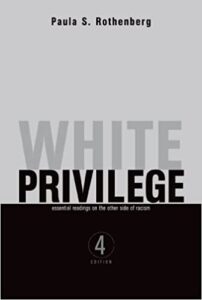 White Privilege: Essential Readings on the other side of Racism by Paula Rothenberg
White Privilege: Essential Readings on the other side of Racism by Paula Rothenberg
The new edition of White Privilege once again challenges readers to explore ideas for using the power and the concept of white privilege to help combat racism in their own lives, and includes key essays and articles by Peggy McIntosh, Richard Dyer, bell hooks, Robert Jensen, Allan G. Johnson, and others. Three additional essays add new levels of complexity to our understanding of the paradoxical nature of white privilege and the politics and economics that lie behind the social construction of whiteness, making this edition an even better choice for educators.
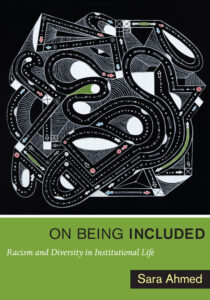 On Being Included: White Privilege: Racism and Diversity in Institutional Life by Sara Ahmed
On Being Included: White Privilege: Racism and Diversity in Institutional Life by Sara Ahmed
On Being Included explores the gap between symbolic commitments to diversity and the experience of those who embody diversity. Commitments to diversity are understood as “non-performatives” that do not bring about what they name. The book provides an account of institutional whiteness and shows how racism can be obscured by the institutionalization of diversity. Diversity is used as evidence that institutions do not have a problem with racism.
About Us

Useful Links
Useful Links
Contact Info
260 Dalhousie Street
Suite 305
Ottawa, Ontario K1N 7E4
Telephone: (613) 241.0018
Fax: (613) 241.0019
Email: admin@casae-aceea.ca
© Copyright 2020-2025 CASAE - ACÉÉA | All Rights Reserved | Privacy Policy | Website by Windrose Web Design

